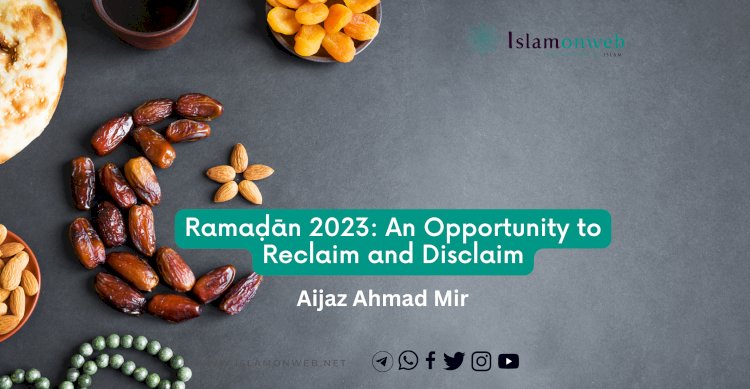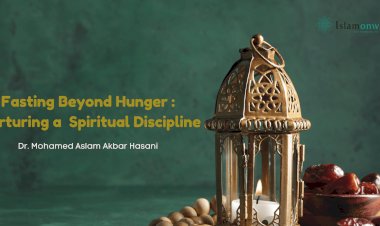Ramaḍān 2023: An Opportunity to Reclaim and Disclaim
Ramaḍān is the ninth month of the Islamic lunar calendar. Muslims throughout the world fast during the month of Ramaḍān from dawn to sunset each day. This year, Ramaḍān is expected to begin on March 22, 2023. Fasts during Ramaḍān have been made compulsory for every healthy adult Muslim, with few exceptions. It is mentioned in the Quran ““Ramaḍān is the month in which the Qur’an was revealed, as guidance for humanity…so whoever of you witnesses the month should fast it.” (2:185). In another place, Allah mentions, “O believers! Fasting is prescribed for you—as it was for those before you—so perhaps you will become mindful ˹of Allah˺ (2:183).
Ramaḍān is an incredible opportunity, most awaited by our discerned ancestors, to reclaim all the good and disclaim all the bad.
Ramaḍān is a month filled with the most incredible blessings and gifts from Allah. It is a time when Muslims can come closer to their Lord and truly connect with Him deeper. This month is an opportunity for all Muslims to transform themselves into a better version of themselves, no matter how strong or weak their connection with Allah may be. As Muslims, we are required to pray five times a day and attend Friday prayers, but it is not uncommon for many to fall short of fulfilling these obligations. However, during Ramaḍān, it is the perfect time to make a change and fully commit to our faith. It is a month when we can leave behind our bad habits and embrace a lifestyle that is more aligned with Islam.
Ramaḍān and Introspection
Ramaḍān is not just about fasting from dawn till dusk; it is a time for self-reflection, introspection, and self-examination. It is a time when we can truly examine our relationship with Allah and strive to improve it. We realize the transient nature of this world and the importance of seeking the pleasure of Allah before it is too late. Moreover, Ramaḍān has the power to transform people's lives. There are countless stories of individuals who have made significant changes in their lives during this blessed month. People who were once distant from Allah, but through the mercy of Allah and their sincere repentance, became pious Muslims. This month gives us the opportunity to break bad habits, improve ourselves, and start anew. Ramaḍān is not just a month of fasting; it is a month of spiritual rejuvenation and transformation. It is a time when we can leave our old ways behind and embark on a journey toward becoming better Muslims. One of my friends said to me that he has high respect for the month of Ramaḍān. He said that though he is not a completely practising Muslim, however during Ramaḍān, he gets a unique, tasteful, spiritual connection with God. He said that Ramaḍān is the most peaceful experience that he has ever had. Undoubtedly, Ramaḍān is the most beautiful experience that one could ever have.
Ramaḍān and Supplications
Ramaḍān is the month of supplications. A Muslim knows that without the help of Allah, he can achieve nothing good. Make more supplications to Allah during the month of Ramaḍān, tell all your worries, obstacles, and difficulties to Allah, and ask Him for help. There is evidence that Allah accepts our supplications during the month of Ramaḍān, especially at the time of breaking fast. The traditions of the Prophet Muhammad (ﷺ) teach us to supplicate during this month. Through supplication, many lives have changed, and it was through the supplication of Prophet Muhammad (ﷺ) that Hazrat Umar (R.A) came into the fold of Islam. True and sincere supplications can entirely change one's life.
Ramaḍān and Good Deeds
Ramaḍān is not just any other month; it is an opportunity for us to increase our good deeds and seek the pleasure of Allah. The Hadith, which states that fasting is for Allah and He shall reward for it, should be a clear indication of the significance of this month. Imagine the blessings and rewards that await us if we utilise this opportunity to do more good deeds.
We Muslims know that our deeds will be accounted for on the day of judgment, and it's natural to fear regretting our actions or lack thereof. But we have been given a chance to change that by doing more good deeds during this blessed month. We should not waste this opportunity by being negligent or complacent.
One of the best ways to earn rewards and the pleasure of Allah during Ramaḍān is through charity and feeding the poor. This not only helps those in need but also purifies our wealth and souls. We should strive to give as much as possible and help those in need. If we were not praying voluntary prayers like Tahajjud, Ramaḍān is the perfect time to start. The Tahajudd prayer at night has immense benefits, both physical and spiritual. It's a time when the gates of Jannah are open, and the Shaytaan is locked away. Allah has blessed Ramaḍān with Laylat- al-Qadr (Night of Power), the night on which Allah first revealed Quran to the Prophet Muhammad (ﷺ) through the angel Gabriel. There are several traditions of prophets that mention the significance of praying during this night. One of the traditions says, "Whoever spends Laylat al-Qadr in prayer out of faith and in the hope of reward will be forgiven his previous sins."
Ramaḍān and Improving Conduct
Ramaḍān is not just a month of fasting; it is an incredible opportunity to improve our conduct and become better human beings. As Muslims, we believe that Prophet Muhammad (ﷺ) was sent to complete the moral conduct of mankind. So, it's our responsibility to follow his teachings and improve our character. Being kind and polite is the hallmark of a good Muslim, and Ramaḍān provides the perfect time to focus on developing these qualities. However, it's not enough to simply practice good manners in public. We need to start with our own families; as Prophet Muhammad (ﷺ) himself said, "The best among you are those who are best to their wives."
In Islam, we are also commanded to be obedient to our parents, especially as they reach old age. The Quran instructs us not to even say a word of “Uff” (expression of disgust) to them. This is a powerful reminder of the importance of respecting our elders and being good children. We should take advantage of this blessed month of Ramaḍān to become better husbands, sons, fathers, relatives, and neighbours. By improving our conduct, we can become a positive influence in our communities and bring about positive change in the world.
Ramaḍān and Discipline
Ramaḍān is the month when one can improve discipline. As Muslims, we constantly strive to strengthen our connection with Allah and deepen our faith. Ramaḍān provides us with the perfect opportunity to do just that. It is a month of self-discipline, a time to break bad habits and establish good ones. During this holy month, we learn how to discipline ourselves for the sake of Allah, not only in terms of our diet but also in our daily routine.
By following a strict schedule of eating during "Suhoor” (the meal eaten before dawn during Ramaḍān) and “Iftar” (the meal eaten after sunset during Ramaḍān), we are reminded that every aspect of our lives must be in accordance with divine injunctions. This serves as a powerful reminder that we are not slaves to our habits but rather servants of Allah. By changing our daily routine during Ramaḍān, we learn to submit to the commands of Allah in every aspect of our lives.
As the month of Ramaḍān draws to a close, it is important that we continue to embody this spirit of discipline in other areas of our lives. By doing so, we can ensure that the lessons we have learned during this holy month are not lost. We must continue to submit to the commands of Allah, striving to become better Muslims and better servants of Allah.
Strengthening your sense of community and belonging
As a Muslim, you have the opportunity to participate in a global act of piety and devotion during the month of Ramaḍān. By joining millions of Muslims around the world in fasting, you can strengthen your sense of community and belonging. You will be part of a collective effort to worship Allah and demonstrate your commitment to the faith. This act of worship is not just about personal sacrifice and discipline. It is also about building strong bonds with your fellow believers and contributing to the greater good of humanity. The values of goodness, morality, and religiosity that are emphasised during Ramaḍān are essential to the fabric of the Muslim community. They are the foundation upon which we build our relationships with one another and with Allah. By participating in Ramaḍān, you will be joining a legacy of piety and virtue that has been passed down through generations of Muslims
Quran and Ramaḍān
The Quran and the month of Ramaḍān share a sacred bond that cannot be understated. This is the month when the divine message of the Quran was revealed to the Prophet Muhammad (ﷺ), making it a month of great significance to Muslims worldwide. Ramaḍān is when believers strive to better themselves by engaging in acts of worship and self-reflection, and there is no better way to do this than by immersing oneself in the Quran.
Fasting during Ramaḍān is not just a physical exercise but a spiritual one too. It allows us to gain control over our desires and channel our energies toward a higher purpose. This heightened state of mindfulness and clarity of mind allows us to be more receptive to the teachings of the Quran. The Quran is a divine book of guidance that guides us in every walk of life. Its teachings provide us with the tools to navigate life's challenges with wisdom and compassion.
During this month, Muslims around the world prioritise their relationship with the Quran, dedicating more time to reciting, studying, and reflecting upon its verses. This connection with the Quran is vital in reinforcing our faith and renewing our commitment to Islam. As we delve deeper into the Quran, we gain a deeper understanding of Allah's message and how to implement it in our daily lives.
The benefits of this reconnection with the Quran are immeasurable. It equips us with the knowledge and wisdom needed to become better Muslims and more compassionate members of society. Through the Quran, we learn about the importance of charity, kindness, and forgiveness. It teaches us how to cultivate inner peace and to approach life's challenges with patience and resilience.
Month of Compassion
The practice of fasting during Ramaḍān is an incredible opportunity to gain a deeper understanding of the struggles faced by the impoverished and needy. By voluntarily experiencing hunger and thirst, we can truly empathize with those lacking necessities. This experience is transformative and teaches us the true meaning of compassion and generosity, making Ramaḍān a month of profound significance.
Throughout Ramaḍān, Muslims are encouraged to be more giving and compassionate towards others. This month serves as a reminder that we are all interconnected and that our actions impact those around us. By participating in acts of kindness and charity during Ramaḍān, we strengthen our connection to our fellow human beings and bring about positive change in our communities.
Moreover, Ramaḍān is a time when many Muslims choose to pay their Zakah, which is an act of worship and charity that is obligatory for those who can do so. Zakah is a means of redistributing wealth and ensuring that those in need are supported. By giving Zakah during Ramaḍān, we demonstrate our commitment to social justice and our dedication to helping those in need.
Awful Awareness of Allah -Taqwa
Ramaḍān is a month to strive for spiritual renewal and transformation. Its greatest gift is taqwa, the pinnacle of Islamic ethics and the ultimate virtue for Muslims. Taqwa is a state of God-consciousness that imbues our actions with religiosity and fear of Allah. It is the key to leading a virtuous life, guiding us to devote ourselves to all that is good and to reject all that is wicked and harmful.
During Ramaḍān, we are given the opportunity to nurture our taqwa through fasting, prayer, and reflection. By abstaining from food and drink during the day, we are reminded of the plight of the poor and encouraged to give to charity. Through nightly prayers, we strengthen our connection to Allah and seek His forgiveness for our sins. And through self-reflection and contemplation, we learn to become more aware of our actions and their impact on ourselves and those around us.
The benefits of taqwa are manifold. It not only leads to spiritual fulfilment but also brings about positive changes in our personal and social lives. It guides us to be kind, just, and compassionate and to avoid harmful behaviours such as lying, cheating, and backbiting. It strengthens our relationships with our families, friends, and communities and encourages us to serve others. Let us beseech Allah to provide us with the awe-inspiring quality of taqwa so that we may grow in it during Ramaḍān and seek to cultivate it throughout the year..
Disclaimer
The views expressed in this article are the author’s own and do not necessarily mirror Islamonweb’s editorial stance.

























Leave A Comment